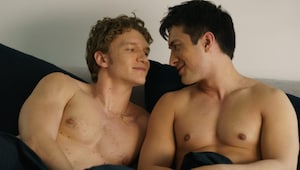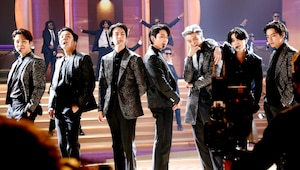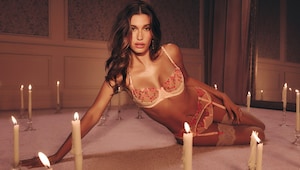Every girl is secretly in love with her book boyfriend, and here's why
Mr Perfect exists, but he’s fictional. Because sometimes the only man who gets it lives in chapter 20 and not in your DMs.

I was in the middle of a reading session last Tuesday, when in the middle of a chapter, I shut my book mid-sentence and just sat there, staring at the wall across my room. The plot wasn’t especially intense. But the man in the book had said something so unexpectedly tender, so emotionally precise, it caught me completely off guard.
It wasn’t dramatic. It wasn’t even particularly quotable. Just a quiet sentence that met the woman in the story exactly where she was—without trying to fix her, outshine her, or turn her pain into a lesson. And for a second, it felt like he was speaking to me, too.
This has happened more times than I care to admit. I’ll be reading, and a single line will stop me cold—not because it’s romantic in the traditional sense, but because it carries the kind of emotional intelligence I rarely come across in real life. I used to brush it off. But lately, I’ve started noticing how instinctively I turn to fictional men to soothe the small, everyday disappointments of dating. When someone ducks accountability, shuts down the second things get real, or responds with detachment instead of curiosity, I find myself thinking—not dramatically, just automatically—he’d never say that.
At first, the comparison felt silly. But then I realised I wasn’t measuring a real person against a fantasy. I was holding him up to the bare minimum: the feeling of being seen and heard. Something that really shouldn’t exist only on a page. And I know I’m not the only one.
It might sound immature at first, but plenty of women are drawn to these so-called “book boyfriends.” Not because we can’t tell the difference between fiction and reality, but because these characters offer something that’s surprisingly rare IRL: patience without ego, love without power plays, presence without emotional laziness.
And once you’ve met that kind of man in a book, it gets a whole lot harder to make excuses for the ones who can’t meet you halfway outside of it.
How it all started (and why we can't stop)
The book boyfriend isn’t some Gen Z fever dream. He’s been breaking hearts and raising standards long before social media knew what to do with him. It started with the likes of Mr Darcy, prideful, perceptive, emotionally constipated in all the right ways. Or Laurie from Little Women, if you still haven’t quite forgiven Jo for saying no.
Everyone has their gateway book. Maybe it was Twilight or The Fault in Our Stars. Or maybe it was something less mainstream, a Wattpad fanfic you read in secret, with a boy who knew her better than she knew herself. But it was never just about him. It was always about the way she was seen. The way he noticed the change in her tone before she even realised she was upset. The way he stayed when things got hard. The way he made softness feel like something you didn’t have to earn.
That feeling, the quiet rush when the closed-off one lets her in, when his hand lingers just long enough to mean something, when he doesn’t push but simply waits, is why we keep coming back. We reread. We highlight. We memorise entire passages like they hold answers. And maybe they do, because deep down, we know these men weren’t just written to be desired; they were written to understand us.
The boom of new adult romance in the early 2010s only made that hit harder. Writers like Colleen Hoover, Emily Henry, and Sarah J Maas gave us hot male leads plus emotional vocabulary. These men had baggage, sure. But they also had range. They listened, they learned, and they held back when it mattered. They didn’t always get it right, but they tried. And try-hard men? Criminally underrated. They made love feel cinematic, while normalising emotional attentiveness. Expected. Deserved.
Why are girls obsessed?
It’s easy to reduce this desire to fantasy. They’re charming, loyal, and devastatingly hot, sure, but it's so much deeper than that.
What we’re really drawn to is the emotional world that builds itself around him. The intimacy unfolds in layers. Nothing is rushed, nothing is taken for granted. Her thoughts carry as much weight as her looks. Her complexity isn’t a problem to be solved but a reality to be respected. Desire never comes at the cost of dignity. It’s the ache of an almost-touch, the slow reveal of a man who softens only for one woman, and the quiet thrill of knowing that woman is the one we’re meant to become.
Like when Josh from The Hating Game memorises Lucy’s quirks even when they’re at war in the office. Or when Ben in Every Summer After never stops loving Percy, even after six years of silence. Or Kaz Brekker from Six of Crows, who aches for Inej so deeply that he won’t even touch her until she says she’s ready.
These fictional men are complex, flawed, even, but they're also fluent in ways that feel almost disorienting when you’re used to modern dating, where vulnerability is often treated like a liability. They’re broody but not emotionally stunted. Protective but never controlling. And most importantly, they see the woman they love in her entirety, not just the curated, likeable parts.
They see her exhaustion, her sharpness, her softness worn thin. And instead of offering solutions or defensiveness, they offer presence. They don’t try to fix her. They sit with her. Quietly, steadily, until she remembers how to hold herself again.
Compare that to today’s reality, where the emotional highlight of your week might be an “lol ur cute” from a man who thinks sending two full sentences is a love language. The bar has been eroded by low-effort texts, soft-launch situationships, and the chronic allergy to accountability. And yet, one chapter into a romance novel, and a fictional man is already doing more emotional labour than most men in their twenties have done in their entire dating history.
Imagine reading Gus Everett saying, “I’m not scared of the dark. I’m scared of not seeing you in it,” in Beach Read by Emily Henry. And then your phone lights up with a “wyd” text so uninspired it makes you want to erase every second you ever considered giving this guy a chance.
The female gaze is superior (and we have receipts)
A man written by a woman is hands down the only guy who knows that “I’m fine” is never what it means. When women craft male characters, they do more than sketch broad strokes of “hero” or “lover.” They imbue them with the very qualities most men learn to hide: emotional literacy, the courage to sit with another’s pain, the willingness to listen without prescribing solutions. These men aren’t presented as flawless paragons. They’re allowed to be flawed, to make mistakes, to stumble, but they never stumble in indifference. They stay, learn, and adapt.
This is the female gaze at work. It doesn’t beautify desire. It writes intimacy with integrity. Women authors make space for both chaos and clarity, the kind that lets love feel earned, not owed. They don’t flatten relationships into rewards for being “good.” They let love be alive. Complicated. Mutual.
Think of Connell in Normal People, whose vulnerability and emotional complexity make him feel achingly real; he doesn’t just talk about feelings, he wrestles with them, and when he opens up, it is just so painfully honest. Or Aaron Blackford in The Spanish Love Deception—stoic, steady, the kind of man who listens more than he speaks, who notices the little things, who never tries to take up more space than he’s given. Then there’s Azriel from A Court of Thorns and Roses, cloaked in shadows and silence, loving from a distance with a kind of quiet loyalty that never asks for attention but never wavers either.
What women writers have figured out and what many real-world men still haven’t is that romance isn’t a power struggle. It’s not a chase. It’s a conversation. And when you read a love story through the female gaze, you don’t just feel seen. You feel safe.
The cultural shift nobody saw coming
What started as a guilty late-night scroll turned into a full-blown cultural takeover, courtesy of BookTok. Suddenly, obsessing over fictional men became more than just a quiet little hobby; it was a collective obsession, complete with its own language, memes, and emotional chaos.
BookTok completely flipped the script on what we want from men. Vulnerability? Hot. A guy who actually listens? Practically a unicorn. The cold, mysterious bad boy? He’s officially out. Today, it’s all about the emotionally fluent softies—the ones who protect without controlling and see the full picture, not just the highlight reel.
And this shift isn’t just staying between the pages. Women are walking away from bare-minimum relationships, calling out emotional unavailability, and raising the bar because fiction didn’t ruin reality; it just reminded us of what it could be.
You can spot the ripple effects everywhere. Men on dating apps are catching on—bios now flex “big communication guy” energy or casually mention “I read romance books, btw.” Some are even picking up novels to figure out what women actually want. (Honestly, good for them. Read the syllabus.)
Because the book boyfriend? He’s no longer just a fantasy. He’s a mirror. A reflection of what women have always craved but rarely received—emotional depth, mutual respect, and tenderness that doesn’t talk down to you.
Lead Image: IMDb
Also read: It is raining sardines, and we are ready to hop on to the wave
more from Life

Why young people are ‘retiring’ early at this viral Malaysian retreat

From Labubus to Hello Kitty—ten tiny things adults are still holding on to for comfort in 2026

Breaking the confidence myth—why you actually don’t need to have it all figured out

'Heated Rivalry' season 2 is coming—and here’s what the books promise

BTS is back on tour—but seems like India missed a stop

2026 is the new 2016—here’s the trend you’ll be bringing back, based on your zodiac

#CosmoKinkyFaves: The cheeky edit of the 50 sex toys that’s got everyone buzzing

#CosmoKinkyFaves: The top 50 must-have lingerie pieces to help you feel confident and sexy

#CosmoKinkyFaves: The top 50 best songs that deserve to be on every sex playlist

Why your situationship might actually be your best sex
